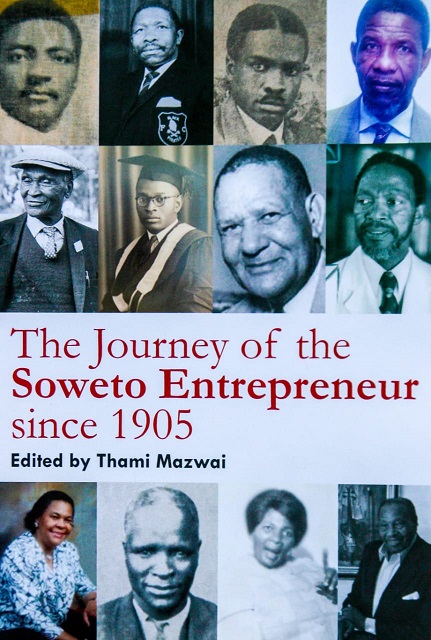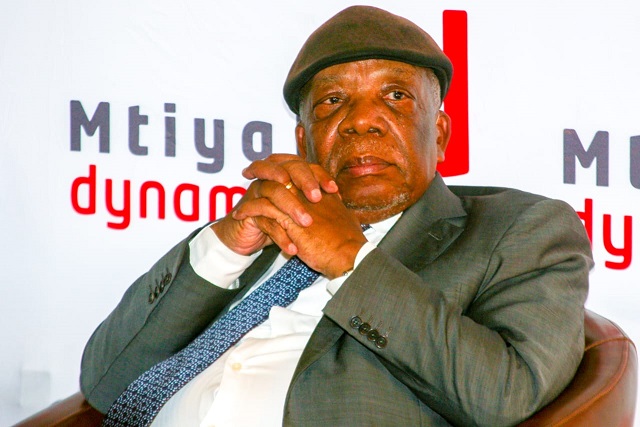THE Journey of the Soweto Entrepreneur since 1905 is a newly-launched book intended to remind current and future generations of their responsibility in growing South Africa’s economy so that the triple challenges of poverty, unemployment and inequality can be met head-on.
Edited by erstwhile journalist, Thami Mazwai and published by UNISA Press, it is composed of chapters written by a plethora of contributors who chart the history of various entrepreneurs who, against the yoke of prohibitive apartheid laws, contributed towards the economic livelihood of the South Western Townships (Soweto).
A 206-page easy read also intended for the public school curriculum, it is interspersed with monochromatic images of the location’s leading figures who over time ensured its self-sustenance from pre 1948 advent of apartheid to 1994’s advent of democracy and beyond!
For ease of comprehending the gist of what the literary offering espouses, following are compendiums of the topics, as well as the authors, tackled in the chronological order they appear.
The journey of the Soweto entrepreneur commences: in this chapter, Mazwai takes the reader through a journey divided by headings exploring the evolution of the Soweto entrepreneur from the juncture of the rural African peasant’s migration to the urban setting and growth of entrepreneurship in Soweto.
Mazwai expounds on how the discovery of minerals at the turn of the 19th century led to a demand of labourers from rural areas to urban ones located at mining centers – with the Land Act of 1913 forcing millions of Blacks to leave their homesteads to seek jobs in town.
The Urban Areas Act of 1923 provided for the settlement of natives to Black locations such as the first official residential location named Orlando.
The demand and supply of these communities’ needs – for food and clothing, etc. – naturally resulted in the emergence of entrepreneurs purposed to meet them. From these ranks appeared the likes of James Sofasonke Mpanza, who sold trading rights to shopkeepers and levied toll on hawkers; Mweli Skota, who was a pivot of the Klipspruit business fraternity and Amawasha, a group of men from KwaZulu-Natal who specialized in washing clothes.
African entrepreneurs in the Apartheid era (1948-1975): in this chapter penned by journalist, Sam Mathe, he summarizes the background of the legal framework informing apartheid legislation intentionally formulated to disadvantage Blacks; delves into township business sectors such as street trading, greengrocer, taverns, takeaways, etc.; informs on the role of Urban Bantu Councils; expounds about the existence of the National African Federated Chamber of Commerce and mentions, amongst others, Richard Maponya (the founder of Maponya Mall) and Habakkuk Shikwane (an industrialist who founded a cane furniture enterprise which once operated from the Orlando Industrial Park).
Entrepreneurship gains traction in Soweto: here Mazwai deals with apartheid and Soweto entrepreneurs; traders organizations (such as Nafcoc) making their mark; the informal sector (i.e. spaza shops); formal and quasi formal (such as Jomo Sono becoming the first Kentucky Fried Chicken franchisee in Soweto and the first laundromat started by Peter Vundla in Rockville) and big retailers vying to get into Soweto.
Soweto – a thriving local market: written by the head of the Faculty of Political Economy at the Mapungubwe Institute for Strategic Relations, Eddie Rakabe, the segment dwells on the local economy and post-1994 spatial and economic reorganization; State-led nodal retail development in Soweto (2001–2011); tourism-led development (i.e. Sakhumzi restaurant); the rush of spaza shops and flashy taverns – optimism in the face of insecurities (R650 million has been allocated for the spaza shop funding programme with the Township Economic Development Act provisioning for Government to spend 40% of procurement budget of goods and services procurement on township-based businesses) as well as from Soweto to Sandton – stories of entrepreneurial success which mentions ex-Fabcos honcho Reggie Hlongwane’s launching of the Pep brand in Soweto.
Liquor and township entrepreneurship: tackled by ex-Unisa lecturer and journalist, Professor Phil Mtimkulu, the portion discusses liquor as a facilitator of Black entrepreneurship and provides context and background of the conflict between ‘kaffir beer’ and White liquor brought about by the politics of the day. Mtimkulu touches on the context for the development of liquor entrepreneurship (i.e. brewing of umqombothi by women in their homes) in Soweto; the growth of shebeens (overseen by owners such as Elijah ‘Mpalampala Outside’ Msibi); the emergence of bootleggers; South African Brewers (a researcher mentions the SAB’s patronage of Black shebeen owners) and liquor entrepreneurship post 1994 (the advent of establishments such as Konka).
The evolution of financial services in Soweto: contributed by the founder of the National Stokvel Association of South Africa, viz, Khehla Lukhele – he journeys the reader through, inter alia, the emergence of the financial sector in Soweto; stokvels (which have membership of more than 11.5 million people with savings valued over R49 billion per annum); burial societies (pioneered by founder member of the ANC, Dr James Moroka); Nafcoc-Permanent Life Assurance Company; African Bank (which opened at Ga-Rankuwa in 1975) and the formation of Soweto Investment Trust Company Limited, etc.
The evolution of Soweto women entrepreneurs: herein entrepreneur and marketer, Busi Skenjana, traces women in the evolution of Soweto entrepreneurship since the 1930s.
Through desktop research and personal interviews of a few of these women she profiles the contributions of, et al., Caroline Tshabalala (said to had been the brains of her husband, Ephraim’s empire dubbed, ‘Soweto miracle story of business management’), Marina Maponya (who alongside her husband, Richard, managed a business empire involving a dairy, restaurant, butchery, general store and supermarkets) and Sally Motlana (once the president of the Black Housewives’ League who opened Sizwe grocery shop in Mofolo Central).

Numerous others in other sectors proliferate this chapter.
The evolution of retail in Soweto: authored by financial journalist, Phakamisa Ndzamela, this section relates the evolution of the retail industry in Soweto from the early century by touching on pioneer retailers in Soweto such as Thomas Ntlebi, Paul Mosaka, Ephraim Tshabalala, Richard Maponya, et al. It also makes mention of retail training (training of staff and provision of expertise in management of businesses); Nafcoc’s opposition of White trading in townships and criticism levelled at Blackchain.
The minibus taxi revolution in Soweto: offered by the director of Fresh Thinking Business School, Dr Meshack Khosa, this portion reconnoitres, inter alia, the origins of taxi operators; the growth of the taxi industry in Soweto (augmented by a table illustrating the rise of permit applications and licenses granted in Johannesburg between 1984 and 1990); taxi associations (SABTA, STA, etc.) and the making of Soweto taxi entrepreneurs such as the first SABTA president, Jimmy Sojane – also the secretary of Orlando Pirates FC in 1973, who played a central role in the taxi industry! Another mentioned is Jabu Mabuza – who went from being a taxi driver to becoming a billionaire!
The evolution of the arts and entertainment sectors in Soweto: is penned by media specialist, Siza Mtimkulu, wherein she casts the spotlight on theatre (especially the contributions of playwright, Gibson Kente); music and dance (as espoused by choristers such as Professor Mzilikazi Kumalo, classical music teacher, Khabi Mngoma and Sipho ‘Hotstix’ Mabuse, et al.); entertainment venues (Eyethu cinema and Lucky Michaels’ Club Pelican, et cetera); fashion and beauty (i. e. Charmaine Modjadji becoming the first Black model to advertise Lux soap on billboards across the country) and photography (the international acclaim Peter Magubane and Alf Kumalo attained through their exposure of the atrocities of apartheid).
The contribution of soccer to Black entrepreneurship in Soweto: jotted by writer, Sekola Sello, the chapter concerns itself with the development of football in Soweto (with the formation of Orlando Pirates FC hailed as a momentous event in the history of South African football); football and entrepreneurship in Soweto (Lucas Radebe owning a logistics company which transports goods on the subcontinent) as well as ponders challenges and success stories involving boxing in which Sello mentions former boxer, Dingaan Thobela leveraging his fame by venturing into a funeral parlour business.
The foreword to the read is provided by the doyen of Black entrepreneurship, viz, Dr Sam Motsuenyane – who incidentally passed away on the eve of the book’s launch – and the collection was project managed by sociologist, Tembeka Ngcebetsha-Mooij, with Mazwai urging in the epilogue for the cubs to learn from the lion!
The Journey of the Soweto Entrepreneur since 1905 is a paperback published by Unisa Press and is available at bookstores across South Africa.
It retails for R250.
Image Jacob MAWELA (Erstwhile journalist, Thami Mazwai, who edited The Journey of the Soweto Entrepreneur since 1905).

